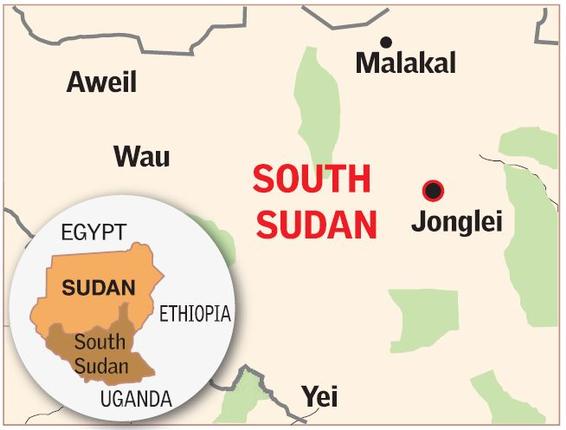ADDIS ABABA/ NEW DELHI, April 9, 2013
Five soldiers of the Indian Army were killed and four injured in an ambush on Tuesday morning of their United Nations peacekeeping mission by unidentified assailants in South Sudan. Seven civilians also perished in the ambush that began at 9 a.m. and continued for over an hour.
Lt. Colonel Mahipal Singh, Havaldars Heera Lal and Bharat Sasmal, Naib Subedar Shiv Kumar Pal and Sipahi Naval Kishore were killed as they escorted a 32-member convoy near the settlement of Gumuruk in Jonglei State. According to agency reports, the convoy was en route to Bor when it was struck by rocket-propelled grenades and small arms fire.
Some members of the convoy are yet to be accounted for. Last month, an Indian soldier was shot at and injured in the same region.
A U.N. spokesperson declined to share details of the nature of the convoy or the number of people missing.
In a telephone conversation, Col. Saurabh Mishra, Commanding Officer of the 6 Mahar regiment in Jonglei, declined to comment as he was focused on evacuating those killed and injured.
The bodies of those killed would be brought back to the country, said official sources in the Ministry of External Affairs.
Defence Minister A.K. Antony lauded the bravery of the slain soldiers and conveyed his grief to their families.
Hilde F. Johnson, Special Representative of the U.N. Secretary-General in South Sudan, condemned the attacked “in the strongest terms,” a U.N. release said.
A contingent of 2,200 Indian Army personnel are deployed with the United Nations Mission in South Sudan (UNMISS). While one group is based in Malakkal on the border with Sudan, the other one is deployed in Jonglei. Elsewhere on the African continent, Indian troops are involved in peacekeeping operations in the Democratic Republic of Congo and Cote d’Ivoire.
“The U.N. peacekeepers were deployed in certain parts of Jonglei, where there is some insecurity,” said Jonglei’s Governor Kuol Manyang Juuk. “Whenever there was any disturbance, the civil population would run to the U.N. camps where they felt secure.”
“The peacekeepers did not engage in any combat, but were friendly and peaceful towards the populace,” he said. A U.N. official confirmed that the peacekeepers conducted regular patrols of the troubled region but were not involved in combat operations.
Jonglei is the largest and most populous State in South Sudan, a country carved out its northern neighbour in 2011 after a brutal civil war spanning many decades. Post-independence, the State has been roiled by inter-ethnic conflict between the Lou Nuer and Murle communities. The conflict has since escalated into a full-blown insurgency led by Murle leader David Yauyau who, the South Sudanese believe, is backed by the government of Sudan. Sudanese officials have repeatedly denied these allegations.
Last week, the U.N. urged South Sudan’s government to protect communities in Jonglei, even as representatives of France, Canada, Norway, the U.S. and the U.K. expressed concern that military conflict, lack of infrastructure, seasonal migration and deterioration of law and order were putting civilian lives at risk. About 17,000 people have been displaced in Jonglei due to the current conflict, according to the U.N.
Apart from providing peacekeepers, India also has significant economic assets in the two countries. Oil and Natural Gas Corporation Videsh Ltd (OVL) has a stake in South Sudan’s oil fields. It has constructed and financed a 741-km pipeline in the north from the Khartoum refinery to Port Sudan on the Red Sea.


